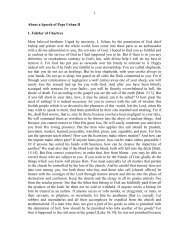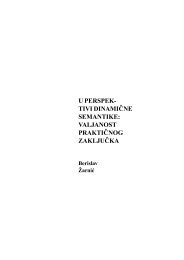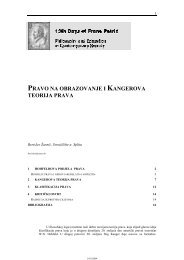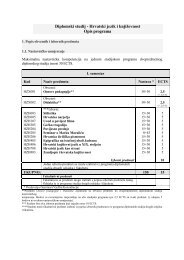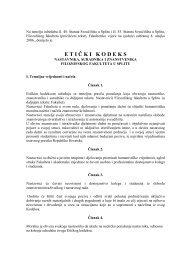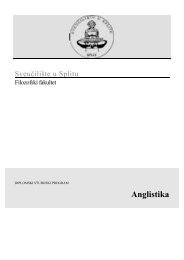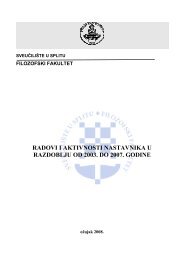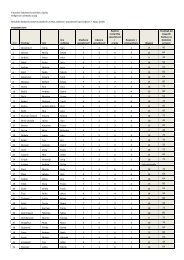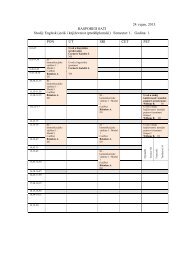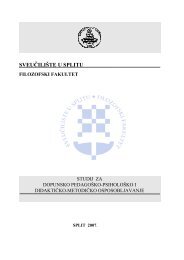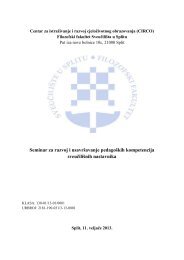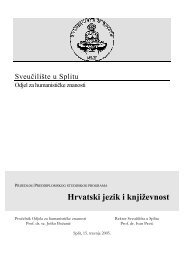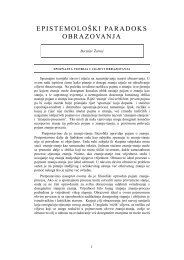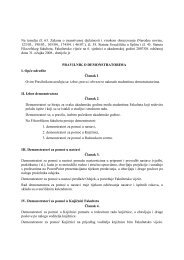English Studies
English Studies
English Studies
You also want an ePaper? Increase the reach of your titles
YUMPU automatically turns print PDFs into web optimized ePapers that Google loves.
G R A D U A T E D E G R E E P R O G R A M M E : E N G L I S H S T U D I E S<br />
Teaching<br />
methods<br />
Assessment<br />
methods<br />
Language of<br />
instruction<br />
Quality<br />
assurance<br />
methods<br />
Benjamins Publishing Company.<br />
Seleskovitch, D. (1994). Interpreting for International Conferences:<br />
Problems of Language and Communication. Paris: Minard Lettres<br />
modernes.<br />
Exercise course; student participation encouraged: individual work, pair<br />
work, group work; problem-solving tasks.<br />
The assessment of student knowledge will be based on the following:<br />
Continuous assessment.<br />
Exam: oral.<br />
<strong>English</strong>.<br />
Student feedback via questionnaires and surveys.<br />
Lecturers responsible for the same subject area collaborate closely and<br />
monitor each other's work. Occasional class observations and appraisal by<br />
Head of Department.<br />
Course title Interpreting – Module 2<br />
Course code HZE902<br />
Type of course Exercise course / Advisory hours<br />
Core course (Optional in 3.1.1.)<br />
Level of course Specialized level course<br />
Year of study Second Semester Four<br />
ECTS<br />
(Number of<br />
credits allocated)<br />
1 ECTS credits<br />
Contact hours (15 practical sessions) = 0.38 credits.<br />
Student study time (18.75 hours) = 0.62 credits.<br />
Name of lecturer Prof Dr Zjena Čulić<br />
Learning<br />
outcomes and<br />
competences<br />
The course focuses on the development of the following competences and<br />
skills: comprehension (analysis and synthesis), speed of comprehension,<br />
production, memory capacity, simultaneity of listening and speaking,<br />
personality traits (stress tolerance)<br />
Prerequisites Competences and skills acquired upon the completion of Translation studies<br />
with elements of contrastive analysis and Translation Methodology - Theory<br />
and Practice courses.<br />
Course contents Process-oriented approach in interpreter training; developing techniques for<br />
translation at sight; consecutive translation and simultaneous translation; the<br />
comprehension phase based on knowledge base and knowledge acquisition;<br />
reformulation of the message; note taking strategies. Application of the<br />
Effort model: listening effort, comprehension effort and reformulation<br />
effort. Interpretation training from the point of view of professional<br />
experience and current teaching practices; the task of interpreting analyzed<br />
from a cognitive psychologist’s point of view; interaction between research<br />
and training; simultaneous interpretation composed of a series of<br />
interdependent skills; cognitive psychology applied to research on aptitude<br />
testing for interpretation; Theorie du sens; research frame moving from<br />
57



